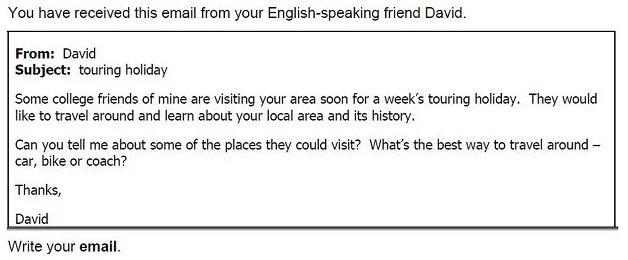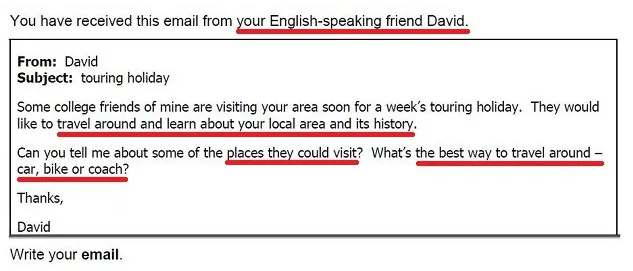-
FCE- Introduction
-
First (FCE) Exam: General OverviewLecture1.1
-
Computer Based Exam TutorialLecture1.2
-
The Cambridge English Scale: ResultsLecture1.3
-
FCE Score: How to calculateLecture1.4
-
Preparing for the exam: What should you know?Lecture1.5
-
-
Paper 1- Reading and Use of English
-
Introduction to the Reading and Use of English section of the FCE examLecture2.1
-
Developing reading skills: skimming, scanning, and reading for detailLecture2.2
-
General Information and Tips- Reading and Use of English- Paper 1Lecture2.3
-
Tips: Part 7- Multiple Matching- Reading and Use of EnglishLecture2.4
-
Practice Part 7-Multiple Matching- Reading and Use of EnglishLecture2.5
-
Tips Part 4-Key Word Transformation- Reading and Use of EnglishLecture2.6
-
More Tips Part 4- Key Word Transformation- Reading and Use of EnglishLecture2.7
-
Practice Part 4- Key Word Transformations- Reading and Use of EnglishLecture2.8
-
Tips Part 6- Gapped Text- Reading and Use of EnglishLecture2.9
-
Practice Part 6- Gapped Text- Reading and Use of EnglishLecture2.10
-
Tips Part 3-Word Formation- Reading and Use of EnglishLecture2.11
-
Practice Part 3- Word Formation-Reading and Use of EnglishLecture2.12
-
Tips Part 5- Multiple Choice- Reading and Use of EnglishLecture2.13
-
Practice Part 5- Multiple Choice- Reading and Use of English-Lecture2.14
-
Tips Part 1- Multiple Choice Cloze- Reading and Use of EnglishLecture2.15
-
More Tips Part 1- Multiple Choice Cloze- Reading and Use of EnglishLecture2.16
-
Practice Part 1- Multiple Choice Cloze- Reading and Use of English-Lecture2.17
-
Tips Part 2- Open Cloze- Reading and Use of EnglishLecture2.18
-
More Tips Part 2- Open Cloze- Reading and Use of EnglishLecture2.19
-
Practice Part 2- Open Cloze- Reading and Use of EnglishLecture2.20
-
General Overview and Tips- Reading and Use of EnglishLecture2.21
-
General Review- Reading and Use of EnglishLecture2.22
-
Paper 1 Practice- Reading and Use of EnglishLecture2.23
-
More Tips and Practice- Part 1- Multiple Choice Cloze-Reading and Use of EnglishLecture2.24
-
More Practice- Part 1- Multiple Choice Cloze- Reading and Use of EnglishLecture2.25
-
More Practice- Part 1- Multiple Choice Cloze- Reading and Use of EnglishLecture2.26
-
More Practice- Part 1- Multiple Choice Cloze- Reading and Use of EnglishLecture2.27
-
More Tips and Practice- Part 2- Open Cloze- Reading and Use of EnglishLecture2.28
-
More Tips and Practice- Part 3- Word Formation- Reading and Use of EnglishLecture2.29
-
More Tips and Practice- Part 4-Key Word Transformation-Reading and Use of EnglishLecture2.30
-
More Practice- Part 4- Key Word Transformation- Reading and Use of EnglishLecture2.31
-
More Practice- Part 4- Key Word Transformation- Reading and Use of EnglishLecture2.32
-
More Practice- Part 4- Key Word Transformation- Reading and Use of EnglishLecture2.33
-
More Tips and Practice- Part 5- Multiple Choice- Reading and Use of EnglishLecture2.34
-
More Practice- Part 5- Multiple Choice- Reading and Use of EnglishLecture2.35
-
More Tips and Practice- Part 6- Gapped Text- Reading and Use of EnglishLecture2.36
-
More Practice- Part 6- Gapped Text- Reading and Use of EnglishLecture2.37
-
More Tips and Practice- Part 7- Multiple Matching- Reading and Use of EnglishLecture2.38
-
Protegido: Sample Paper Test- Reading and Use of English 01 hour 15 minLecture2.39
-
-
Grammar
-
Dynamic vs Stative Verbs- MN Video- Listening- Grammar FocusLecture3.1
-
Dynamic vs Stative Verbs – Quiz – Practice Focus 10 questionsQuiz3.1
-
Verb + Gerund- Reading and Writing- Grammar FocusLecture3.2
-
Verb + Infinitive- Reading and Writing- Grammar FocusLecture3.3
-
Verb + Gerund/Infinitive- Reading and Writing- Grammar FocusLecture3.4
-
Verb + Gerund/Infinitive- Reading and Writing- Grammar FocusLecture3.5
-
The Use of Articles (a/an/the)- Reading and Writing- Grammar FocusLecture3.6
-
-
Vocabulary
-
Vocabulary development and strategies for word formation and collocationsLecture4.1
-
Vocabulary- Learning TipsLecture4.2
-
Collocations- Part 1Lecture4.3
-
Collocations- Part 2Lecture4.4
-
Collocations- Part 3Lecture4.5
-
Collocations- Part 4Lecture4.6
-
Collocations- Part 5Lecture4.7
-
Prefixes and Suffixes- Part 1Lecture4.8
-
Word Formation -“-ed” vs “-ing”Lecture4.9
-
Phrasal Verbs (1): meanings and typesLecture4.10
-
Phrasal Verbs (2): SeparabilityLecture4.11
-
-
Paper 2- Writing
-
Writing- Preparing for the examLecture5.1
-
Writing- Some Common QuestionsLecture5.2
-
Writing- Dos and Don’tsLecture5.3
-
Writing- How is FCE Writing Scored?Lecture5.4
-
Informal Letter/Email- Writing GuideLecture5.5
-
Informal Email/Letter- Sample and TipsLecture5.6
-
Informal Letter or Email-Tips/Sample questions and answersLecture5.7
-
Informal Email/Letter- Sample and PracticeLecture5.8
-
Formal Email/Letter – Steps to WritingLecture5.9
-
Letter of Application- Writing GuideLecture5.10
-
Letter of Application- Understanding and ModelLecture5.11
-
Letter of Application- Sample and PracticeLecture5.12
-
Letter of Application-Writing Topics- PracticeLecture5.13
-
Formal and Semi-formal Letter/ Email- Tips and SamplesLecture5.14
-
Email/Letter General Writing GuideLecture5.15
-
Article- Steps to WritingLecture5.16
-
Article- Writing Guide,Tips and Sample Questions and AnswersLecture5.17
-
Article- How to Write an Article- VideoLecture5.18
-
Article- Writing Topics- PracticeLecture5.19
-
Essay- Writing GuideLecture5.20
-
Writing Essays for the FCE- Types and OrganizationLecture5.21
-
Essay- Writing Guide, Tips and Sample Questions and AnswersLecture5.22
-
Essay- Tips and SamplesLecture5.23
-
Essay- Samples,Tips, and PracticeLecture5.24
-
Review- Writing Guide, Tips, and Sample Questions and AnswersLecture5.25
-
Review- Steps to Writing and TipsLecture5.26
-
Review- Tips and SampleLecture5.27
-
Review- Tips and SampleLecture5.28
-
Review- Sample Questions- PracticeLecture5.29
-
Report- First Steps to Writing a ReportLecture5.30
-
Report- Writing GuideLecture5.31
-
Report- Writing Sample Questions-PracticeLecture5.32
-
Writing-10 B2 First Writing Exam TipsLecture5.33
-
Writing- B2 First Writing ChecklistLecture5.34
-
Protegido: Writing- B2 First Writing Sample Paper Test Parts 1 and 2 01 hour 20 minLecture5.35
-
Writing Essays- 5 most common mistakesLecture5.36
-
-
Paper 3- Listening
-
FCE Listening- Introduction and General TipsLecture6.1
-
FCE Listening- Do’s and Dont’sLecture6.2
-
FCE Listening Tips- Part 1- Multiple ChoiceLecture6.3
-
Listening Practice- Part 1- Multiple ChoiceLecture6.4
-
Listening Practice- Part 1- Multiple ChoiceLecture6.5
-
Listening Practice- Part 1- Multiple ChoiceLecture6.6
-
FCE Listening Tips- Part 2- Sentence CompletionLecture6.7
-
Listening Practice- Part 2- Sentence CompletionLecture6.8
-
Listening Practice- Part 2- Sentence CompletionLecture6.9
-
Listening Practice- Part 2- Sentence CompletionLecture6.10
-
FCE Listening Tips- Part 3- Multiple MatchingLecture6.11
-
Listening Practice- Part 3- Multiple MatchingLecture6.12
-
Listening Practice- Part 3- Multiple MatchingLecture6.13
-
Listening Practice- Part 3- Multiple MatchingLecture6.14
-
Listening Practice- Part 3- Multiple MatchingLecture6.15
-
FCE Listening Tips- Part 4- Multiple ChoiceLecture6.16
-
Listening Practice- Part 4- Multiple ChoiceLecture6.17
-
Listening Practice- Part 4- Multiple ChoiceLecture6.18
-
Listening Practice- Part 4- Multiple ChoiceLecture6.19
-
Protegido: Listening- Sample Paper Test 1Lecture6.20
-
Protegido: Listening- Sample Paper Test 2Lecture6.21
-
-
Paper 4- Speaking
-
Varieties of EnglishLecture7.1
-
Speaking- Preparing for the examLecture7.2
-
Speaking- Some More TipsLecture7.3
-
Speaking- Some Common QuestionsLecture7.4
-
Speaking- Do’s and Don’tsLecture7.5
-
Speaking- Examiners CommentsLecture7.6
-
Speaking- Exam AssessmentLecture7.7
-
Speaking Part 2- Exam Tips and PracticeLecture7.8
-
Speaking Part 2- PracticeLecture7.9
-
Speaking Part 2- PracticeLecture7.10
-
Speaking Part 3- Exam Tips and PracticeLecture7.11
-
Speaking Parts 3 and 4-Exam Tips and PracticeLecture7.12
-
Speaking Part 1- Exam Tips and PracticeLecture7.13
-
Speaking Part 1- PracticeLecture7.14
-
Speaking Part 1- PracticeLecture7.15
-
Speaking Exam ReviewLecture7.16
-
Speaking Test PracticeLecture7.17
-
-
Topic Related Activities
Informal Email/Letter- Sample and Tips
Sample Task
This is what a typical email writing task in the FCE exam might look like. It is an actual email that you have to reply to and, of course, we can analyse this task in exactly the way described above.
Firstly, we want to see what to include in our email and, secondly, who we are writing to in order to choose the correct register. The best way to do this is to underline the key pieces of information. Take a look.
Always underline the important pieces of information.
I’ve underlined the reason why David’s friends are coming to your area (“…travel around and learn about …”), which gives us a general idea of what to write about as well as two very specific things David is asking us to tell him (“places they could visit” and “the best way to travel around”).
On top of that, when you write to a friend like David you have to write in an informal style. Generally speaking, this means that you should use contractions ( e.g. I’m, don’t), colloquial expressions (e.g. tons of, ‘What’s happening?’) as well as phrasal verbs and idioms (end up, ‘Guess what!’)? .
Generally, an email or letter always comes in 4-5 parts:
- an opening formula and SHORT paragraph
- 2-3 topic paragraphs depending on how many topic points there are in the task
- Why would you like to go on the trip?
- What skills do you have which would be useful on the trip?
- What experience do you have of travelling (if any)?
- a SHORT closing paragraph and formula
This pattern works for every single email/letter so try to memorise this.
Don’t forget to plan your email/letter
There is one thing that, unfortunately, too many candidates do wrong when they take the writing exam and even when they practise. By developing this bad habit they often waste a lot of time during the actual test and sometimes lose valuable marks.
Of course, I’m talking about making a plan before you start writing. Take a few minutes to note down the different paragraphs (see the example in the previous section on organising your emails and letters) and add just a few words to help you give your text a logical structure.
You will see how much easier it gets when you can focus on the content of your writing task instead of the organisation and logical order of your ideas.


